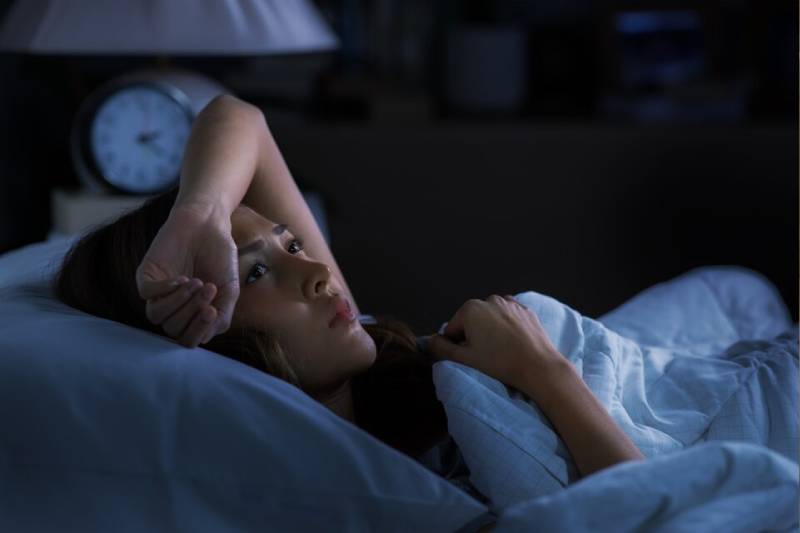Cbt For Insomnia: Sleep Well With Natural Therapies

The significance of a good night's sleep cannot be overstated when it comes to maintaining our physical health, cognitive function, emotional well-being, and overall quality of life. Physiologically, during sleep, the body engages in essential tasks such as tissue repair, immune system strengthening, and the release of growth hormones.
From a cognitive standpoint, sleep enhances cognitive functions like problem-solving, creativity, and decision-making. Furthermore, a proper sleep cycle helps regulate mood and stress levels, contributing to mental resilience, improving emotional health. A good night’s rest can be described as a tranquil sanctuary where the body and mind harmoniously rejuvenate. It helps improve memory retention, and improves calorie regulation as well. It should be obvious at this point as to why a good night’s sleep is important for a person.
What Are The Common Symptoms Of Insomnia?
 Although the total amount of required sleep varies from person to person, for most adults, the average sleep required per day is around 7-8 hours. However, due to stresses, traumas, and many possible physical and psychological conditions, people often suffer from lack of sleep. Insomnia is more common than you would expect. Common symptoms of insomnia include :
Although the total amount of required sleep varies from person to person, for most adults, the average sleep required per day is around 7-8 hours. However, due to stresses, traumas, and many possible physical and psychological conditions, people often suffer from lack of sleep. Insomnia is more common than you would expect. Common symptoms of insomnia include :
- Difficulty falling asleep.
- Not feeling well-rested even after a night’s sleep.
- Constantly waking up during the night.
- Constantly waking up too early.
- Irritability, depression, or anxiety
Insomnia can make it harder for you to function properly. If the symptoms listed above are something you’re familiar with, then it’s best to get yourself diagnosed by a medical professional.
What Are The Common Causes Of Insomnia?
- Stress – Stress is an incredibly common cause of insomnia for most people. Whether it’s because of work, studies, health, finance, etc., high stress can lead to restless nights. Other causes of stress include trauma or stressful life events.
- Inconvenient schedules – If you travel a lot or have to work erratic hours, then it can mess up with your biological clock, leading to irregular sleep schedules. Additionally, just having a poor sleep schedule can also cause this. This can lead to insomnia.
- Digestion and other problems – Overeating close to bed-time can be a cause of insomnia as well. Eating right before sleeping can cause digestion problems, which can lead to sleeplessness and other discomforts.
Insomnia Diagnosis – How? When?
If your sleeplessness and other sleeping troubles persist, then going to a doctor is the best course of action. In general, doctors will do the following to determine whether or not you have insomnia and determine the causes of it:
- Physical examination – If the cause of the insomnia is hidden, then physical examinations can help reveal the underlying cause of the insomnia.
- Sleep study – In a sleep study, the doctor monitors your body as you sleep to determine the potential cause of insomnia. This can help uncover underlying causes like other sleep related ailments (such as sleep apnea), which can be causing insomnia.
What Is Cognitive Behavioral Therapy For Insomnia (CBT-I)?
Cognitive Behavioral Therapy for Insomnia is a structured and evidence-based psychological treatment designed to help individuals overcome insomnia and improve their sleep patterns. CBT-I addresses the cognitive, behavioral, and emotional factors that contribute to sleep difficulties. It is one of the most prescribed insomnia therapies available currently that doesn’t require medication. It aims to identify and modify negative thought patterns and behaviors that can exacerbate insomnia. The therapy is typically conducted by trained therapists, but there are also self-help programs and resources available for individuals to use on their own. CBT-I includes procedures such as :
- Sleep restriction – The amount of time spent in bed is reduced to reduce to time spent awake in bed. This can help condition the mind to focus only on sleep when in bed.
- Stimulus control – This component focuses on establishing a strong association between the bed and sleep by minimizing non-sleep-related activities in bed.
- Cognitive restructuring – This process addresses negative thoughts and worries about sleep and helps people challenge and change unrealistic expectations and anxieties related to sleep.
- Relaxation techniques – Techniques such as deep breathing, progressive muscle relaxation, and guided imagery are used to reduce physical and mental tension, making it easier to fall asleep and stay asleep.
Insomnia Therapies for Natural Sleep
If medication and psychological therapy isn’t enough for you, then there are many natural sleep therapies that you can try. These natural insomnia therapies encompass a range of techniques and practices that can help improve sleep without resorting to medication. Common natural sleep therapies include :

- Herbal teas – Certain herbal teas, such as chamomile, valerian root, passionflower, and lavender, have calming properties that can promote relaxation and improve sleep quality. Drinking a warm cup of these teas before bedtime may help you wind down.
- Aromatherapy – Essential oils like lavender, chamomile, and bergamot can be diffused in your bedroom or added to a warm bath before sleep. Aromatherapy has been shown to have a soothing effect and can create a relaxing environment conducive to sleep and is one of the most popular natural therapies for insomnia.
- Mindfulness meditation – Practicing mindfulness meditation can help quiet the mind and reduce anxiety, making it easier to fall asleep. Guided meditation apps or videos can provide step-by-step instructions for relaxation techniques.
- Yoga – Gentle yoga poses and stretches, particularly those that focus on deep breathing and relaxation, can promote a sense of calm, and improve sleep quality. Avoid vigorous or stimulating yoga close to bedtime.
- Progressive muscle relaxation – This technique involves systematically tensing and then relaxing each muscle group in the body. It can help release physical tension and promote relaxation before sleep.
Some other common remedies to improve sleep include limiting screen time before bed, establishing a bedtime routine, maintaining a sleep schedule, and limiting caffeine and alcohol intake. Additionally, one can also increase physical activity to help the body regular its circadian rhythm effectively.
Concluding Thoughts
Insomnia is not fun to live with. Not only can it have severe psychological problems, it can also cause physical issues, leading to poor physical and mental health. While going to the doctor is usually the best way to get diagnosed for insomnia and determining the underlying cause of it, medication might not be for everyone. Cognitive Behavioral Therapy for Insomnia is certainly one of the most popular insomnia therapies out there, proven for its effectiveness. However, alternative natural sleep therapies also exist, which include herbal teas, aromatherapy, yoga, and various breathing and muscle exercises.
Related Articles
- 30 Sep 24
Updating Soon The Episodes
- 30 Sep 24
Storing Essential Oils
- 30 Sep 24
What Are Essential Oils
- 30 Sep 24
Science Of Essential Oils
- 30 Sep 24
Happy To Receive Naari Samman Award
- 30 Sep 24
How Are Essential Oils Obtained?
- 30 Sep 24
Gateway To Africa - Istanbul
- 30 Sep 24
Et Global Indian Leader 2022
- 30 Sep 24
Can Essential Oils Help With Self-Care?
- 30 Sep 24
Pain Remedy Essential Oils
- 30 Sep 24
Asian - African Iconic Brand Awards 2022
- 30 Sep 24
Core & Pure Pain Buster Oil
- 30 Sep 24
Tea Tree Essential Oil From Core & Pure
- 30 Sep 24
Business Icon Award
- 30 Sep 24
